- Home
- William Gibson
Count Zero Page 4
Count Zero Read online
Page 4
Then she glanced to the left, where the elegant gray paper lay on the desktop. She’d chosen this hotel at random, when she’d grown tired of shopping. She’d told no one she was here, and certainly no one from the Galerie Duperey.
6
BARRYTOWN
HE STAYED OUT FOR something like eight hours, by the clock on his mother’s Hitachi. Came to staring at its dusty face, some hard thing wedged under his thigh. The Ono-Sendai. He rolled over. Stale puke smell.
Then he was in the shower, not sure quite how he’d gotten there, spinning the taps with his clothes still on. He clawed and dug and pulled at his face. It felt like a rubber mask.
“Something happened.” Something bad, big, he wasn’t sure what.
His wet clothes gradually mounded up on the tile floor of the shower. Finally he stepped out, went to the sink and flicked wet hair back from his eyes, peered at the face in the mirror. Bobby Newmark, no problem.
“No, Bobby, problem. Gotta problem . . .”
Towel around his shoulders, dripping water, he followed the narrow hallway to his bedroom, a tiny, wedge-shaped space at the very back of the condo. His holoporn unit lit as he stepped in, half a dozen girls grinning, eyeing him with evident delight. They seemed to be standing beyond the walls of the room, in hazy vistas of powder-blue space, their white smiles and taut young bodies bright as neon. Two of them edged forward and began to touch themselves.
“Stop it,” he said.
The projection unit shut itself down at his command; the dreamgirls vanished. The thing had originally belonged to Ling Warren’s older brother; the girls’ hair and clothes were dated and vaguely ridiculous. You could talk with them and get them to do things with themselves and each other. Bobby remembered being thirteen and in love with Brandi, the one with the blue rubber pants. Now he valued the projections mainly for the illusion of space they could provide in the makeshift bedroom.
“Something fucking happened,” he said, pulling on black jeans and an almost-clean shirt. He shook his head. “What? Fucking what?” Some kind of power surge on the line? Some flukey action down at the Fission Authority? Maybe the base he’d tried to invade had suffered some strange breakdown, or been attacked from another quarter . . . But he was left with the sense of having met someone, someone who . . . He’d unconsciously extended his right hand, fingers spread, beseechingly. “Fuck,” he said. The fingers balled into a fist. Then it came back: first, the sense of the big thing, the really big thing, reaching for him across cyberspace, and then the girl-impression. Someone brown, slender, crouching somewhere in a strange bright dark full of stars and wind. But it slid away as his mind went for it.
Hungry, he got into sandals and headed back toward the kitchen, rubbing at his hair with a damp towel. On his way through the living room, he noticed the ON telltale of the Ono-Sendai glaring at him from the carpet. “O shit.” He stood there and sucked at his teeth. It was still jacked in. Was it possible that it was still linked with the base he’d tried to run? Could they tell he wasn’t dead? He had no idea. One thing he did know, though, was that they’d have his number and good. He hadn’t bothered with the cutouts and frills that would’ve kept them from running a backtrack.
They had his address.
Hunger forgotten, he spun into the bathroom and rooted through the soggy clothing until he found his credit chip.
He had two hundred and ten New Yen stashed in the hollow plastic handle of a multibit screwdriver. Screwdriver and credit chip secure in his jeans, he pulled on his oldest, heaviest pair of boots, then clawed unwashed clothing from beneath the bed. He came up with a black canvas jacket with at least a dozen pockets, one of them a single huge pouch across the small of the back, a kind of integral rucksack. There was a Japanese gravity knife with orange handles beneath his pillow; that went into a narrow pocket on the jacket’s left sleeve, near the cuff.
The dreamgirls clicked in as he was leaving: “Bobby, Bobb-y, come back and play. . . .”
In his living room, he yanked the Ono-Sendai’s jack from the face of the Hitachi, coiling the fiber-optic lead and tucking it into a pocket. He did the same with the trode set, then slid the Ono-Sendai into the jacket’s pack-pocket.
The curtains were still drawn. He felt a surge of some new exhilaration. He was leaving. He had to leave. Already he’d forgotten the pathetic fondness that his brush with death had generated. He parted the curtains carefully, a thumb-wide gap, and peered out.
It was late afternoon. In a few hours, the first lights would start blinking on in the dark bulks of the Projects. Big Playground swept away like a concrete sea; the Projects rose beyond the opposite shore, vast rectilinear structures softened by a random overlay of retrofitted greenhouse balconies, catfish tanks, solar heating systems, and the ubiquitous chicken-wire dishes.
Two-a-Day would be up there now, sleeping, in a world Bobby had never seen, the world of a mincome arcology. Two-a-Day came down to do business, mostly with the hotdoggers in Barrytown, and then he climbed back up. It had always looked good to Bobby, up there, so much happening on the balconies at night, amid red smudges of charcoal, little kids in their underwear swarming like monkeys, so small you could barely see them. Sometimes the wind would shift, and the smell of cooking would settle over Big Playground, and sometimes you’d see an ultralight glide out from some secret country of rooftop so high up there. And always the mingled beat from a million speakers, waves of music that pulsed and faded in and out of the wind.
Two-a-Day never talked about his life, where he lived. Two-a-Day talked biz, or, to be more social, women. What Two-a-Day said about women made Bobby want to get out of Barrytown worse than ever, and Bobby knew that biz would be his only ticket out. But now he needed the dealer in a different way, because now he was entirely out of his depth.
Maybe Two-a-Day could tell him what was happening. There wasn’t supposed to be any lethal stuff around that base. Two-a-Day had picked it out for him, then rented him the software he’d need to get in. And Two-a-Day was ready to fence anything he could’ve gotten out with. So Two-a-Day had to know. Know something, anyway.
“I don’t even have your number, man,” he said to the Projects, letting the curtains fall shut. Should he leave something for his mother? A note? “My ass,” he said to the room behind him, “out of here,” and then he was out the door and down the hall, headed for the stairs. “Forever,” he added, kicking open an exit door.
Big Playground looked safe enough, except for a lone shirtless duster deep in some furious conversation with God. Bobby cut the duster a wide circle; he was shouting and jumping and karate-chopping the air. The duster had dried blood on his bare feet and the remnants of what had probably been a Lobe haircut.
Big Playground was neutral territory, at least in theory, and the Lobes were loosely confederated with the Gothicks; Bobby had fairly solid affiliations with the Gothicks, but retained his indie status. Barrytown was a dicey place to be an indie. At least, he thought, as the duster’s angry gibberish faded behind him, the gangs gave you some structure. If you were Gothick and the Kasuals chopped you out, it made sense. Maybe the ultimate reasons behind it were crazy, but there were rules. But indies got chopped out by dusters running on brainstem, by roaming predatory loonies from as far away as New York—like that Penis Collector character last summer, kept the goods in his pocket in a plastic bag . . .
Bobby had been trying to chart a way out of this landscape since the day he was born, or anyway it felt that way. Now, as he walked, the cyberspace deck in the pack-pocket banged against his spine. Like it, too, was urging him to get out. “Come on, Two-a-Day,” he said to the looming Projects, “get your ass down outa there and be in Leon’s when I get there, okay?”
Two-a-Day wasn’t in Leon’s.
Nobody was, unless you wanted to count Leon, who was probing the inner mysteries of a wall-screen converter with a bent paper clip.
“Why don’t you just get a hammer and pound the fucker till it works?” Bobby as
ked. “Do you about as much good.”
Leon looked up from the converter. He was probably in his forties, but it was hard to say. He seemed to be of no particular race, or, in certain lights, to belong to some race that nobody else belonged to. Lots of hypertrophied facial bone and a mane of curly, nonreflective black hair. His basement pirate club had been a fixture in Bobby’s life for the past two years.
Leon stared dully at Bobby with his unnerving eyes, pupils of nacreous gray overlaid with a hint of translucent olive. Leon’s eyes made Bobby think of oysters and nail polish, two things he didn’t particularly like to think about in connection with eyes. The color was like something they’d use to upholster barstools.
“I just mean you can’t fix shit like that by poking at it,” Bobby added uncomfortably. Leon shook his head slowly and went back to his exploration. People paid to get into the place because Leon pirated kino and simstim off cable and ran a lot of stuff that Barrytowners couldn’t otherwise afford to access. There was dealing in the back and you could make “donations” for drinks, mostly clean Ohio hooch cut with some synthetic orange drink Leon scored in industrial quantities.
“Say, uh, Leon,” Bobby began again, “you seen Two-a-Day in here lately?”
The horrible eyes came up again and regarded Bobby for entirely too long. “No.”
“Maybe last night?”
“No.”
“Night before?”
“No.”
“Oh. Okay. Thanks.” There was no point in giving Leon a hard time. Lots of reasons not to, actually. Bobby looked around at the wide dim room, at the simstim units and the unlit kino screens. The club was a series of nearly identical rooms in the basement of a semi-residential rack zoned for singles and a sprinkling of light industry. Good soundproofing: You hardly ever heard the music, not from outside. Plenty of nights he’d popped out of Leon’s with a head full of noise and pills, into what seemed a magic vacuum of silence, his ears ringing all the way home across Big Playground.
Now he had an hour, probably, before the first Gothicks started to arrive. The dealers, mostly black guys from the Projects or whites from the city or some other ’burb, wouldn’t turn up until there was a patch of Gothicks for them to work on. Nothing made a dealer look worse than just sitting there, waiting, because that would mean you weren’t getting any action, and there was no way a genuinely hot dealer would be hanging out in Leon’s just for the pleasure of it. It was all hotdog shit, in Leon’s, weekenders with cheap decks who watched Japanese icebreaker kinos . . .
But Two-a-Day wasn’t like that, he told himself, on his way up the concrete stairs. Two-a-Day was on his way. Out of the Projects, out of Barrytown, out of Leon’s. On his way to the City. To Paris, maybe, or Chiba. The Ono-Sendai bumped against his spine. He remembered that Two-a-Day’s icebreaker cassette was still in it. He didn’t want to have to explain that to anyone. He passed a news kiosk. A yello fax of the New York edition of the Asahi Shimbun was reeling past a plastic window in the mirrored siding, some government going down in Africa, Russian stuff from Mars . . .
It was that time of day when you could see things very clear, see every little thing so far down the streets, fresh green just starting from the black branches of the trees in their holes in the concrete, and the flash of steel on a girl’s boot a block away, like looking through a special kind of water that made seeing easier, even though it was nearly dark. He turned and stared up at the Projects. Whole floors there were forever unlit, either derelict or the windows blacked out. What did they do in there? Maybe he’d ask Two-a-Day sometime.
He checked the time on the kiosk’s Coke clock. His mother would be back from Boston by now, had to be, or else she’d miss one of her favorite soaps. New hole in her head. She was crazy anyway, nothing wrong with the socket she’d had since before he was born, but she’d been whining for years about static and resolution and sensory bleedover, so she’d finally swung the credit to go to Boston for some cheapass replacement. Kind of place where you don’t even get an appointment for an operation. Walk in and they just slap it in your head. . . . He knew her, yeah, how she’d come through the door with a wrapped bottle under her arm, not even take her coat off, just go straight over and jack into the Hitachi, soap her brains out good for six solid hours. Her eyes would unfocus, and sometimes, if it was a really good episode, she’d drool a little. About every twenty minutes she’d manage to remember to take a ladylike nip out of the bottle.
She’d always been that way, as long as he could remember, gradually sliding deeper into her half-dozen synthetic lives, sequential simstim fantasies Bobby had had to hear about all his life. He still harbored creepy feelings that some of the characters she talked about were relatives of his, rich and beautiful aunts and uncles who might turn up one day if only he weren’t such a little shit. Maybe, he thought now, it had been true, in a way; she’d jacked that shit straight through the pregnancy, because she’d told him she had, so he, fetus Newmark, curled up in there, had reverberated to about a thousand hours of People of Importance and Atlanta. But he didn’t like to think about being curled up in Marsha Newmark’s belly. It made him feel sweaty and kind of sick.
Marsha-momma. Only in the past year or so had Bobby come to understand the world well enough—as he now saw it—to wonder exactly how she still managed to make her way in it, marginal as that way had become, with her bottle and the socket ghosts to keep her company. Sometimes, when she was in a certain mood and had had the right number of nips, she still tried to tell him stories about his father. He’d known since age four that these were bullshit, because the details changed from time to time, but for years he’d allowed himself a certain pleasure in them anyway.
He found a loading bay a few blocks west of Leon’s, screened from the street by a freshly painted blue dumpster, the new paint gleaming over pocked, dented steel. There was a single halogen tube slung above the bay. He found a comfortable ledge of concrete and sat down there, careful not to jar the Ono-Sendai. Sometimes you just had to wait. That was one of the things Two-a-Day had taught him.
The dumpster was overflowing with a varied hash of industrial scrap. Barrytown had its share of gray-legal manufacturers, part of the “shadow economy” the news faces liked to talk about, but Bobby never paid much attention to news faces. Biz. It was all just biz.
Moths strobed crooked orbits around the halogen tube. Bobby watched blankly as three kids, maybe ten at the oldest, scaled the blue wall of the dumpster with a length of dirty white nylon line and a makeshift grapple that might once have been part of a coatrack. When the last one made it over the top, into the mess of plastic scrap, the line was drawn swiftly up. The scrap began to creak and rustle.
Just like me, Bobby thought, I used to do that shit, fill my room up with weird garbage I’d find. One time Ling Warren’s sister found most of somebody’s arm, all wrapped in green plastic and done up with rubber bands.
Marsha-momma’d get these two-hour fits of religion sometimes, come into Bobby’s room and sweep all his best garbage out and gum some God-awful self-adhesive hologram up over his bed. Maybe Jesus, maybe Hubbard, maybe Virgin Mary, it didn’t much matter to her when the mood was on her. It used to piss Bobby off real good, until one day he was big enough to walk into the front room with a ballpeen hammer and cock it over the Hitachi; you touch my stuff again and I’ll kill your friends, Mom, all of ’em. She never tried it again. But the stick-on holograms had actually had some effect on Bobby, because religion was now something he felt he’d considered and put aside. Basically, the way he figured it, there were just some people around who needed that shit, and he guessed there always had been, but he wasn’t one of them, so he didn’t.
Now one of the dumpster kids popped up and conducted a slit-eyed survey of the immediate area, then ducked out of sight again. There was a clunking, scraping sound. Small white hands tipped a dented alloy canister up and over the edge, lowering it on the nylon line. Good score, Bobby thought; you could take the thing to a me
tal dealer and get a little for it. They lowered the thing to the pavement, about a meter from the soles of Bobby’s boots; as it touched down, it happened to twist around, showing him the six horned symbol that stood for biohazard. “Hey, fuck,” he said, drawing his feet up reflexively.
One of them slid down the rope and steadied the canister. The other two followed. He saw that they were younger than he’d thought.
“Hey,” Bobby said, “you know that could be some real bad shit? Give you cancer and stuff.”
“Go lick a dog’s ass till it bleeds,” the first kid down the rope advised him, as they flicked their grapple loose, coiled their line, and dragged the canister around the corner of the dumpster and out of sight.
He gave it an hour and a half. Time enough: Leon’s was starting to cook.
At least twenty Gothicks postured in the main room, like a herd of baby dinosaurs, their crests of lacquered hair bobbing and twitching. The majority approached the Gothick ideal: tall, lean, muscular, but touched by a certain gaunt restlessness, young athletes in the early stages of consumption. The graveyard pallor was mandatory, and Gothick hair was by definition black. Bobby knew that the few who couldn’t warp their bodies to fit the subcultural template were best avoided; a short Gothick was trouble, a fat Gothick homicidal.
Now he watched them flexing and glittering in Leon’s like a composite creature, slime mold with a jigsaw surface of dark leather and stainless spikes. Most of them had nearly identical faces, features reworked to match ancient archetypes culled from kino banks. He chose a particularly artful Dean whose hair swayed like the mating display of a nocturnal lizard. “Bro,” Bobby began, uncertain if he’d met this one before.
“My man,” the Dean responded languidly, his left cheek distended by a cud of resin. “The Count, baby”—as an aside to his girl—“Count Zero Interrupt.” Long pale hand with a fresh scab across the back grabbing ass through the girl’s leather skirt. “Count, this is my squeeze.” The Gothick girl regarded Bobby with mild interest but no flash of human recognition whatever, as though she were seeing an ad for a product she’d heard of but had no intention of buying.

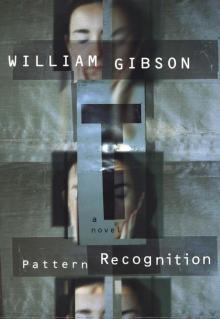 Pattern Recognition
Pattern Recognition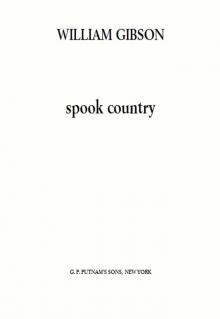 Spook Country
Spook Country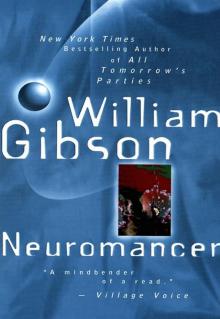 Neuromancer
Neuromancer Skinner's Room
Skinner's Room The Difference Engine
The Difference Engine Mona Lisa Overdrive
Mona Lisa Overdrive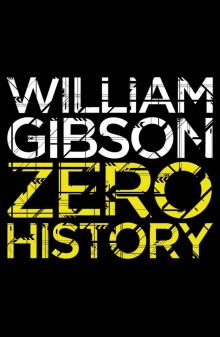 Zero History
Zero History The Peripheral
The Peripheral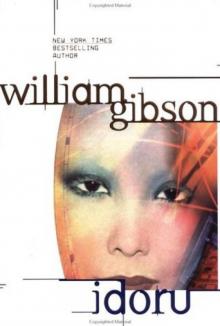 Idoru
Idoru Johnny Mnemonic
Johnny Mnemonic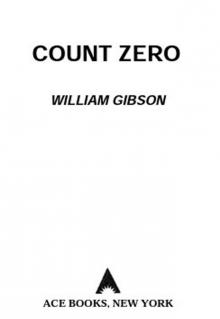 Count Zero
Count Zero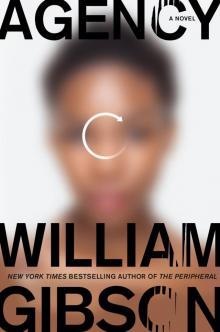 Agency
Agency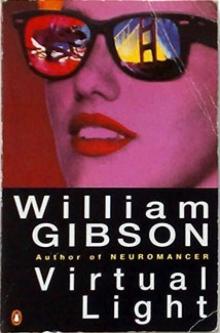 Virtual Light
Virtual Light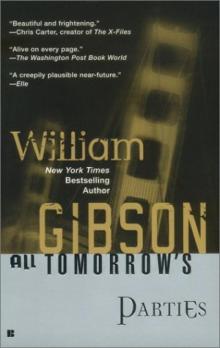 All Tomorrow's Parties
All Tomorrow's Parties The Miracle Worker
The Miracle Worker Disneyland with the Death Penalty
Disneyland with the Death Penalty Idoru tb-2
Idoru tb-2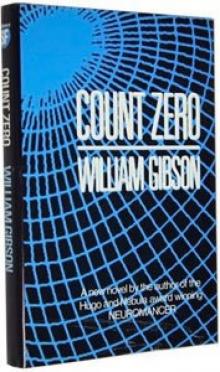 Count Zero s-2
Count Zero s-2 The Gernsback Continuum
The Gernsback Continuum New Rose hotel (tales)
New Rose hotel (tales)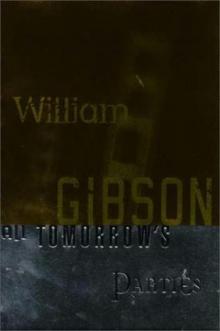 All Tomorrow's Parties bt-3
All Tomorrow's Parties bt-3 Hinterlands
Hinterlands Thirteen Views Of A Cardboard City
Thirteen Views Of A Cardboard City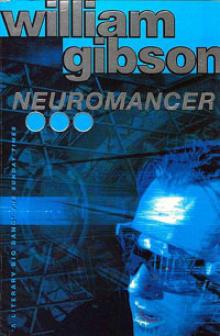 Neuromancer ts-1
Neuromancer ts-1 Virtual light b-1
Virtual light b-1